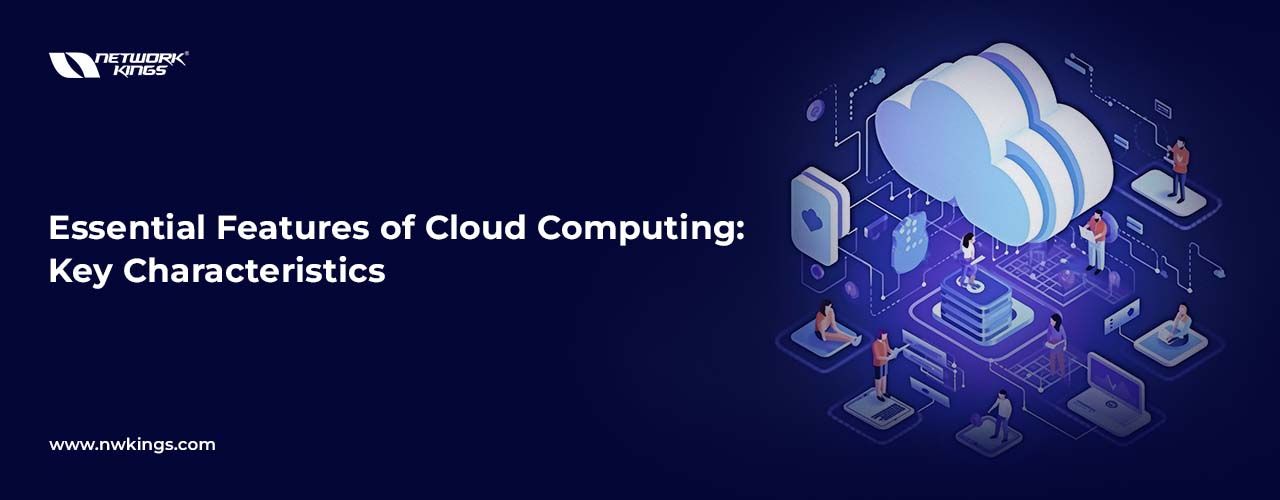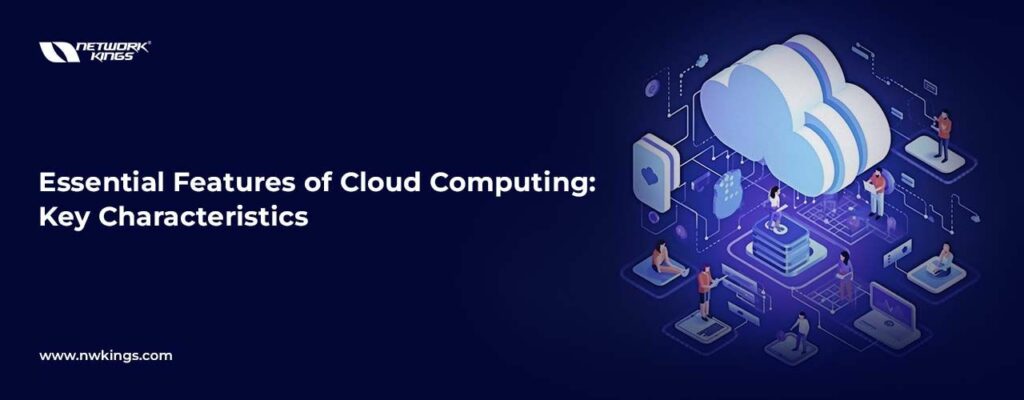
Let us discuss the features of cloud computing in detail. Cloud computing is quickly gaining traction as a technology that offers swathes of benefits to businesses and users alike. With the potential for secure cloud storage, cost savings, mobility options, corporate advantages and so much more – it is revolutionising how we use modern tech!
If you are a big business or an independent operator looking to capitalise on all the perks of cloud computing then this blog will explain the perks and features of cloud computing in detail. So let us find out what incredible things are possible with cloud computing – prepare yourself for some awesome opportunities!
Exploring the Concept of Cloud Computing

Cloud Computing is becoming an ever more popular idea among businesses and organisations across the globe, as they aim to cut their costs and expand quicker. But what does it mean? This blog post will take a deep dive into Cloud Computing, looking at the features that make it such an appealing option for numerous firms.
Basically, with Cloud Computing you can access services from the net via remote servers rather than on your computer or server set up locally – quite revolutionary stuff! How much easier life would be if we didn’t have to bother installing lots of software packages ourselves; instead being able to get whatever applications are needed in moments through our browser windows…
Cloud Computing allows businesses to access data and applications without having to install anything on individual machines. This is way more cost-effective, as well as saves time spent on maintenance, by freeing up IT personnel for other important tasks. What’s more, with Cloud Computing companies don’t have to purchase costly software licenses or hardware anymore – many of the operations are performed through these remote servers which are managed and maintained by the provider.
So it’s a win-win situation all around: money saved while being able to carry out essential processes that wouldn’t be possible otherwise!
Security is another big bonus of using Cloud Computing. Providers have some advanced security protocols in place to safeguard user data from potential threats and malware, including multi-factor authentication systems which boost this protection even further.
Virtual backup services are also great for giving users peace of mind when it comes to losing data – they can store their files securely offsite should anything happen that could lead to corrupting or deleting them. What would you do if something like that happened?
The scalability of Cloud Computing is useful for businesses as well; they can easily and swiftly raise storage, bandwidth or other resources in the face of growing demand without having to buy new hardware or sign lengthy contracts. This means that when a company experiences an unexpected rush due to promotional campaigns etc., their resource needs can be quickly met with minimal disruption.
In addition, companies tend to save cash over time through employing Cloud Computing: instead of buying technology outright which soon becomes obsolete and has no resale value once it has been replaced, they only pay for infrastructure and services used – providing a much more financial sound solution in the long run.
Delving into Cloud Storage: Its role and importance

Cloud storage has been a hot topic of debate and discussion in the tech world lately. It’s worth taking some time to understand why it is so important, how it works, and what role it plays within today’s digital environment. Cloud storage enables organizations to securely keep their data on remote servers instead of using local ones or hard drives – something that simply couldn’t have happened without cloud computing technology!
This means businesses can be more efficient since they no longer need to worry about storing their files locally; freeing them up from having to invest money into maintaining adequate hardware resources for file storage purposes.
The fantastic advantage of cloud storage is its flexibility. Businesses don’t need to pour a lot into their IT framework as they can now rent space depending on their needs, going up or down respectively. Cloud storage is typically rented by organisations based on a pay-as-you-go system – only paying for what they use and scaling according to demand. So businesses can get access to all their documents from any part of the world and collaborate with people in different parts of the globe; how amazing is that?!
What’s more, cloud providers habitually give corporate discounts to their bigger customers – making renting space on these platforms even cheaper. Moreover, when it comes to safeguarding valuable company data, cloud storage offers advanced security features compared with traditional hard drives.
Amazon’s S3 buckets are an example of this; they make encrypting documents both at rest and in transit easy and secure online backups can be automated practically effortlessly! It also allows us to set rules for various operations (read/write), ensuring the information stays safe from people who aren’t authorized while still being accessible by those who need it.
To sum up then: through introducing Cloud Computing into businesses’ lives companies have seen a real revolution in how they store and access their data. As opposed to physical hard drives that take up room, we now get virtual rental spaces which gives our firms greater freedom drafting plans according to what is demanded – minimizing cost significantly whilst maximizing protection against potential viruses or hardware breakdowns.
Unveiling the key features of Cloud Computing
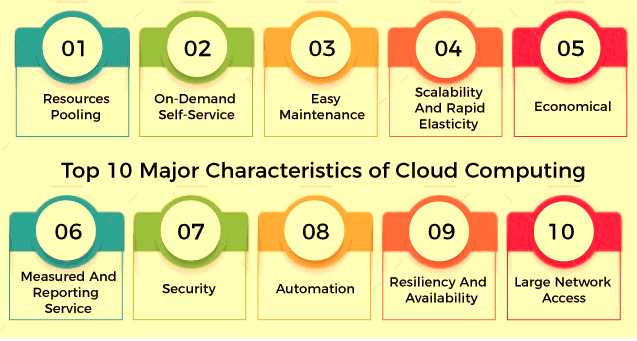
Cloud computing has become something of a big deal in the tech world. It’s certainly here to stay, and many businesses are already taking advantage of its offerings – but what is it? And why does everyone seem so keen on cloud-based solutions? This blog will explore some of the key features that make cloud computing such an attractive option for organisations across the globe.
One very significant aspect is scalability; with cloud systems, companies can scale their applications up or down as business demands require. The flexibility this offers means they don’t need to purchase more capacity than necessary – only adding resources when needed – saving them time and money at every turn!
Cloud computing means businesses can easily scale up or reduce their usage without any hassle or extra costs for setting up infrastructure. It also takes away the worry of maintaining hardware and software, as this is all managed by the cloud provider – making it much simpler and cheaper to look after IT. Security should be at the top of everyone’s list when considering cloud computing; it offers such a valuable benefit that shouldn’t go unnoticed.
Cloud providers such as Amazon Web Services (AWS) and Microsoft Azure provide advanced layers of security, including data encryption, multi-factor authentication, identity and access management and firewalls to keep the data safe from malicious attacks. All these features lumped together in a single platform make up for an incredibly robust security environment that businesses can benefit from. But another major bonus about cloud computing is its cost efficiency for organisations – how amazing would it be if you could cut down on costs while simultaneously increasing your level of protection?
For startup companies, there’s no need to worry about surprise upfront costs like buying servers or setting up datacenters as it can all be done through the cloud provider in an efficient and automated way, you only pay for what you use – making it a great option for businesses big and small. What’s more, if multiple customers make use of shared infrastructure on public clouds such as Google Cloud Platform (GCP), they could even benefit from discounted rates due to economies of scale. Sounds good right?
Finally, another great advantage of cloud computing is its flexibility when it comes to deployment options. From private clouds to hybrid clouds – businesses have the option of choosing whichever setup works best for them and allows them to customise their applications according to specific requirements while gaining access to some major vendor services like database hosting or analytics functionality without having set up these environments on-premise in their data centre infrastructure.
All these features make cloud computing a very attractive prospect for organisations across different industries who are looking at leveraging cutting-edge technology solutions without spending too much money upfront or worrying about IT maintenance complexities associated with managing hardware/software internally – making it an incredibly powerful platform which provides countless advantages over traditional architectures!
Data Security: A prime aspect of Cloud Computing
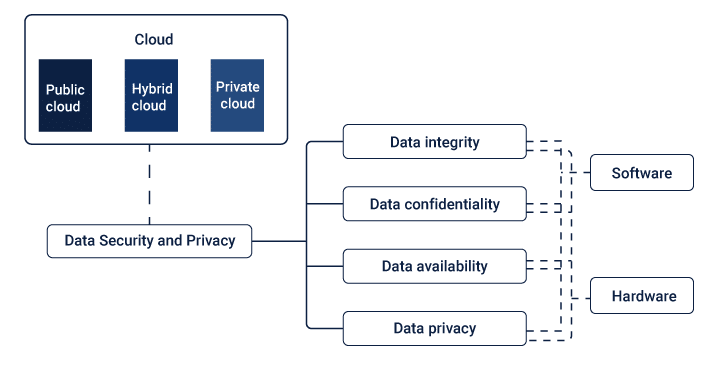
Data security is an essential component of cloud computing. Without it, sensitive customer and business information may be easily exposed to cyber criminals making the use of cloud computing very dangerous indeed! There are many benefits associated with it but data security has got to take priority. Maintaining up-to-date safeguards against malicious actors is critical for users of the Cloud to secure their systems from attack.
Cloud computing provides businesses with a wide range of tools which can help them protect their data; authentication technologies, encryption techniques and plenty more technical measures too – all aimed at defending your digital assets as best they possibly can…but how effective are these?
Proving their identity is what users must do to gain access to cloud services or applications. Encryption then scrambles the data into something unreadable so only those with permission can see it. Firewalls and intrusion prevention systems are on hand too, shielding against malicious software or hacking attempts. Backup systems also come in useful when storing data for a cloud environment; this guarantees that information won’t get lost even if a system fails – any missing info can be retrieved swiftly with such backup systems!
What’s more, all customers’ data is stored safely across multiple locations where there isn’t any single point of breakdown which gives further protection from potential ransomware assaults or other intrusions. Although cloud computing can provide comprehensive information security solutions, organisations are required to take extra steps too such as investing in employee training programs on cybersecurity best practices and setting up additional safety software on servers hosted in the cloud that can identify malicious activities like viruses or malware intrusions.
Organisations should also make certain their deals contain stipulations about how vendors must manage customer data privacy and set out clear policies around who has access to confidential info within the organisation itself. These actions may look laborious but when considering them while increasing your business operations using cloud technology it is well worth every effort!
Understanding the Cost Efficiency of Cloud Computing
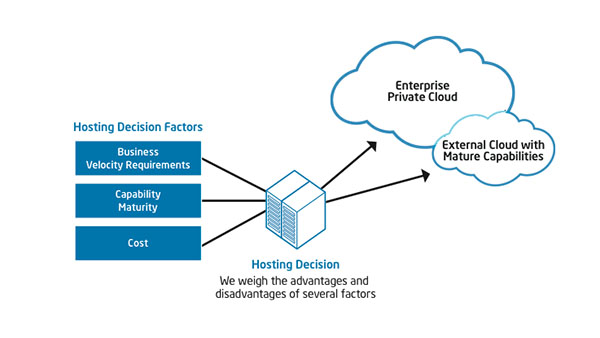
Cloud computing is a revolutionary technology which has shifted the way firms and private users access data, host services and store applications. However, it can be difficult to evaluate the cost efficiency of cloud computing as there are plenty of things that need to be taken into account. So let`s see how you could work out what pricing plan would suit your wants best.
To begin with, assess the pros of cloud storage versus conventional hosting solutions because while traditional hosting options may seem economical in theory they usually come with hefty one-off costs for hardware upkeep and software updates plus extra room for storing stuff etc…
Cloud computing offers an agile approach that allows scalability as and when you need it, all without having to spend too much money at the start. This makes it ideal for organisations who don’t want to commit long-term or invest a huge sum of cash straight away. It’s worth bearing in mind what type of cloud system would be best suited to your business requirements – do you go for private clouds, public ones or hybrid? Private clouds offer secure systems with dedicated resources but there are extra costs involved regarding upkeep and assistance.
Public clouds are usually cheaper, but come with fewer options in terms of security and privacy; these are better for organisations that want to move non-critical functions such as email hosting or infrastructure monitoring systems over onto a cloud. Hybrid clouds provide even greater flexibility by combining things from both private and public solutions, enabling companies to relocate workloads between different settings when needed.
When it comes to cost-effectiveness on the cloud, you need to bear in mind any extra features or services which may be required down the line (for instance training support or customer service). It is worth investigating available discounts like per-usage billing or usage-based concessions before settling on a provider so you can get maximum value out of your investment concerning long-term savings capability and stability of quality levels throughout time.
Mobility Solutions: Enhancing Flexibility with Cloud Computing
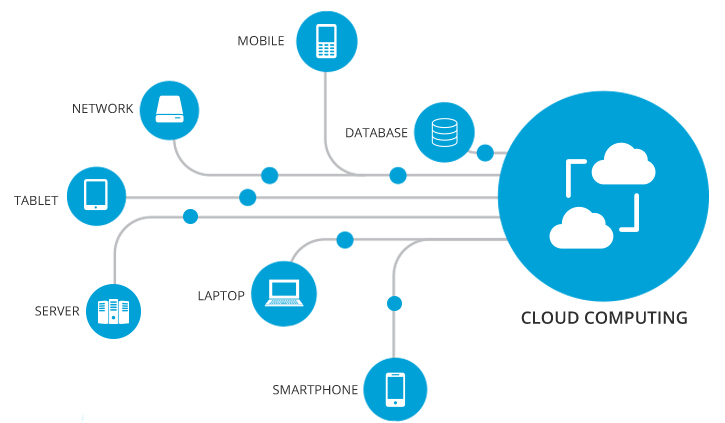
Cloud computing is becoming increasingly popular with businesses of all sizes, due to its adaptability and scalability. Mobility solutions are taking full advantage of cloud technology too, to improve both operational efficiency and the customer experience.
Leveraging the power of the cloud means mobility solutions can be accessed quickly as needed without having to invest money into expensive hardware infrastructure or software licenses – making it simpler for developers, deployers and managers alike when creating applications that will support mobile users across various industries. How exactly does this work? What kind of innovations might we see through these enhanced processes?
Are you looking for a way to increase productivity and cut associated costs? Cloud-based mobility solutions could be the answer. With cloud computing, employees can access their data or files from anywhere in the world as long as they have an internet connection; this is much cheaper than traditional IT systems. This means that companies can save money when it comes to managing multiple devices amongst staff members – all with just one simple solution!
When it comes to the healthcare industry, cloud mobility offers a great opportunity for patient data to be securely shared between medical personnel on various devices. It enhances security measures for information and online transactions while making sure only authorised people have access when needed. Plus, analytics tools can help healthcare providers determine how different treatments are impacting patients’ health in the long run – something that would’ve been difficult without this technology at hand.
Businesses looking into cloud-based mobility also stand to gain from improved customer service opportunities – through mobile apps they’re able to provide extra services without needing physical stores or staff present all of the time. Customers too benefit as payments via mobile wallets become much easier than before; likewise, augmented reality capabilities mean customers don’t need to leave home when trying to identify products they want and purchase them quickly afterwards either!
All these advantages make cloud-based mobility solutions increasingly attractive options for companies aiming towards flexibility within today’s digital world.
Business Benefits Derived from Cloud Computing

Cloud computing has utterly revolutionised the way businesses work. From small business owners to Fortune 500 companies, organisations of all sizes are seizing the benefits presented by the cloud. Cloud computing has given these organisations access to technologies that used to be either too costly or time-consuming for them previously.
It presents numerous advantages like scalability, cost savings, malleability and improved security – when it comes down to what kind of commercial profit can be drawn from this technology? It boils down to three main categories: scalability; cost-efficiency and increased safety provisions!
One of the main advantages for businesses when it comes to cloud computing is that they can scale up and down quickly. This advantage is so influential since companies no longer have to invest in expensive physical infrastructure if their needs change, instead, they are able take benefit from what the cloud environment offers and adjust accordingly – without needing any additional hardware or software expenditure.
The savings in cost that come with either scaling up or down are also fairly impressive – meaning more of the organisation’s money is kept within it rather than being spent on hardware and software updates every time a company changes its resources needs. But for those organisations dealing with sensitive data, cloud computing can provide an extra layer of security compared to traditional systems; could this be why so many businesses have chosen to go down this route?
With in-built encryption protocols, disaster recovery services and other advanced safety measures set up, businesses can ensure that their data remains safe and secure all the time whilst still enjoying the advantages of cloud storage systems to keep great quantities of data securely away from the site.
What’s more, one of the major benefits linked with operating through cloud computing is economic flexibility; firms no longer need to make hefty investments before launching new projects or initiatives as everything can now be done by using pay-as-you-go models without any long-lasting agreements required. Furthermore, customers only shell out for what they use – meaning there are no extra expenditures connected with unutilised assets which was typically true for traditional IT infrastructures.
How Cloud Computing streamlines business processes?
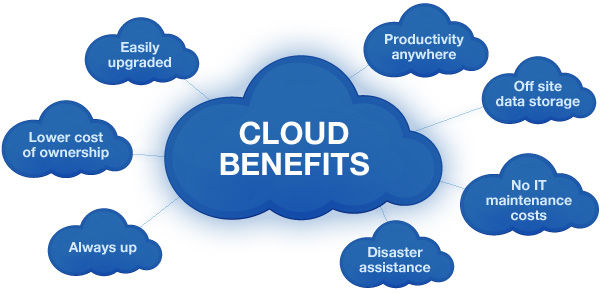
Cloud computing has completely transformed the way businesses operate. It makes running those processes much smoother and gives companies a chance to do more with fewer resources. This web-based tech helps organisations save time, lower costs and enhance efficiency without compromising quality – quite an impressive feat!
Cloud computing allows firms to keep their data in a secure external position which can be accessed swiftly via any device that’s connected up online. That means personnel can remotely access all of their documents from wherever they are located, making remote work simpler than ever before.
Another advantage of cloud computing is automation for its procedures – how awesome!
Businesses can automate mundane tasks such as creating customer records, entering data into an accounting system or drafting contracts – all without having to take on any extra staff members or purchasing expensive software programs. This makes it less complex for companies when manage their business affairs, enabling them to concentrate more on other crucial aspects like marketing and product development. Cloud computing also presents scalability for firms who require it.
Companies can smoothly enlarge or reduce their storage scope in line with their requirements without needing a hefty investment in hardware equipment or increasing IT personnel numbers. As a consequence of this, cloud-hosted solutions regularly turn out as cost-efficient choices for medium-sized businesses that may not have enough financial resources available for installing physical servers setup. Altogether speaking, cloud-based technology gives numerous advantages which could be useful for enterprises hoping to optimise operations whilst still saving money!
From mechanising traditional processes up until scaling storage capacity simply and rapidly; benefits from using cloud computing cannot be overlooked – these should certainly be taken advantage of by every company wanting to create smoother running conditions whilst remaining ahead of competing in today’s digital world.
The role of Cloud Computing in boosting productivity
Cloud Computing is now a major part of the current digital world, making it easier for companies to become much more supple and efficient in their activities. By utilising cloud computing services, firms big or small can amplify productivity across many elements of their venture. This can be achieved by allowing teams to work together faster than ever before.
A principal gain that comes with cloud computing is scalability – using cloud infrastructure makes it easy and swift for businesses to quickly increase or decrease according to their firm’s requirements. Have you encountered any instances where these benefits have been realised?
The flexibility of cloud computing makes it easier for organisations to rapidly adjust to varying workloads, allowing them to stay in the game as the market is always changing. Moreover, one of the biggest advantages that come with this technology is its ability to make collaboration between various departments and teams inside an organisation simpler.
Instances like Microsoft Teams, Slack or Asana are all used on a day-to-day basis by companies who need their remote groups from different places/time zones linked up together quickly; eliminating long winding manual processes and improving communication resulting in projects finished faster than ever before.
Finally, one of the biggest benefits provided by cloud computing is data security. Cloud storage solutions are kitted out with state-of-the-art encryption technology to guarantee sensitive information stays shielded at all times and can also be accessed from anywhere in the world throughout an organisation. Moreover, these services offer automatic backups too which prevents any loss due to hardware malfunction or malicious attacks.
Altogether using cloud tech enables businesses to get more productivity while maintaining a safe environment for their data simultaneously. With this combination of improved collaboration abilities as well as better safety features companies have the assurance that they’re getting the best value out of their digital resources yet carrying on with peace about online possessions.
Future trends and advancements in Cloud Computing
Cloud Computing is developing at a rapid rate and making massive strides in the tech sphere. Businesses are using it to store their data, students can access online classes – cloud computing is rapidly becoming an integral part of our lives. So naturally there’s no shortage of trends and improvements coming out yearly within this field; one that stands out among them all being ‘hybrid cloud computing’. What could be more beneficial than combining the power of both private and public clouds?
With the development of cloud computing, businesses are now able to combine public and private clouds for maximum efficiency and flexibility. This means that companies can make use of both types of services depending on their specific needs while still ensuring security from outside threats.
Furthermore, virtual desktops have become a viable alternative to physical computers in recent years; they offer an effective solution which requires less capital than buying actual machines – making them an attractive option for organisations looking to save money on hardware costs.
What’s more, virtual desktops are easier to handle and look after compared with regular PCs – making them a particularly attractive option for businesses who are searching for economical solutions. Plus, Artificial Intelligence (AI) and machine learning have taken huge strides in Cloud Computing over the last twelve months. Companies can now make use of AI not only to forecast what their customers might do next but also to automate laborious tasks such as customer service or system upkeep that would usually need manual labour.
Services like these which rely on AI improve efficiency while at the same time reducing running costs for organisations allowing them to direct their attention elsewhere towards things that matter most plus driving innovation quicker than ever before! As cloud computing is being used increasingly we will expect even further progressions over the years ahead paving the way in how technology interacts with us today – it is groundbreaking stuff!
Wrapping Up!
To sum things up, cloud computing is transforming the way businesses function and provides increased safety measures, cost-effectiveness and flexibility. Corporations can now store masses of information without having to buy pricey machinery. This money saved can be put into different areas that need investment while employing cloud services for a more efficient output and productivity boost. Data security has been improved as well allowing companies worldwide access whilst not needing to invest expensively in physical offices – quite revolutionary!
Cloud Computing offers countless prospects for organisations trying their best to stay afloat in these ever-changing digital times; it’s no wonder this technology continues to gain such popularity in the business world today – an invaluable resource indeed!
Are you keen to enhance your understanding of cloud architecture? If so, what are you waiting for, sign up for our Cloud Architect Master Program right away! Our course offers a well-rounded overview of the industry and all it entails. You’ll be taught how to devise solutions in design, deployment management and security concerning cloud infrastructures; plus learn about core components of technologies related to clouds.
Moreover, experts have planned out this program thus making sure that its learners receive top-notch education on the topic. So don’t hesitate any longer – enrol yourself now and become a certified Cloud Architect!
Are you looking to take your career to the next level and become a cloud architecture whiz? If so, we’ve got just what you need! Our Cloud Architect Master Program is designed with everything you need to learn – from designing distributed systems, creating cloud applications and setting up secure networks in the cloud.
With our mix of online courses plus real-world projects thrown into the mix, there’s no better way of getting an intimate knowledge of all things clouds quickly. Once finished, certification as a Cloud Architect awaits – one that comes with plenty of exciting job prospects for years ahead too if it sounds like something perfect for your goals then why wait any longer? Don’t miss out on this brilliant chance – sign up today and accomplish those ambitions tomorrow!
Happy Learning!

